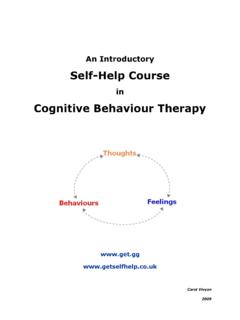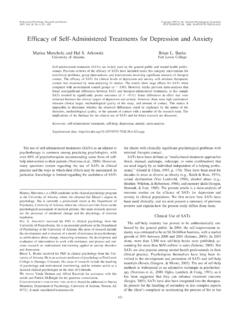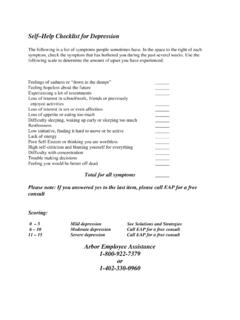Transcription of The 6‐month effectiveness of Internet‐based guided self ...
1 Research: Care DeliveryThe 6-month effectiveness of Internet-based guidedself- help for depression in adults with Type 1 and 2diabetes mellitusD. D. Ebert1,2,3, S. Nobis2, D. Lehr2, H. Baumeister4, H. Riper2,5, R. P. Auerbach6,F. Snoek7,8, P. Cuijpers2,5and M. Berking1,21 Department of Clinical Psychology and Psychotherapy, Friedrich-Alexander-University Erlangen-Nuremberg, Erlangen, Germany,2 Division of Online HealthTrainings, Innovation Incubator, Leuphana University, L uneburg,3 Department for Health Care Policy, Harvard University, Boston, MA, USA,4 Department ofClinical Psychology and Psychotherapy, Institute of Psychology and Education, University of Ulm, Ulm, Germany,5 Department of Clinical Psychology, VUUniversity, Amsterdam, The Netherlands,6 Department of Psychiatry, Harvard Medical School, McLean Hospital, Belmont, MA, USA,7 Department of MedicalPsychology, VU University Medical Centre and Academic Medical Center and8 Institute for Health and Care Research (EMGO)
2 , VU University Medical Centre,Amsterdam, The NetherlandsAccepted 21 June 2016 AbstractAimThe aim of this research is to examine the 6-month effects of an Internet-based guided self - help intervention forcomorbid depressive symptoms in people with (n=260) with Type 1 or 2 diabetes and elevated depressive symptoms [Center forEpidemiological Studies depression Scale (CES-D) 23] were randomly assigned to a guided Internet-based self -helpintervention or a control condition (treatment as usual+online psychoeducation about depression ). The primaryoutcome was a change in depressive symptom severity (CES-D) from baseline to 6-month follow-up. The secondaryoutcomes included numbers of people achieving treatment response (reliable change of depressive symptoms) andremission (CES-D 16), as well as the effects on glycaemic control, diabetes-related emotional distress and diabetesacceptance. Repeated measures analysis of variance examined between-group differences using intent-to-treat conditions showed improvements in depression severity: intervention condition,d= [95%confidence interval (95% CI): to ]; control conditiond= (95% CI: to ).
3 Changes weresignificantly greater in the intervention condition with a large between-group effect size (d= , 95% CI: ). Accordingly, effects on response [relative risk (RR)= (95% CI: to ),P< ] and remission[RR= (95% CI: to ),P< ] were in favour of the intervention group, as were differences in change indiabetes emotional distress (d= , 95% CI: to ), and physical and mental functioning [Short Form HealthSurvey (SF-12) Physicald= (95% CI: to ) and SF-12 Mentald= (95% CI: to )]. Theintervention group was not superior with regard to glycaemic control, diabetes self -management and trial indicates that Internet-based guided self - help treatments for depression in people with diabetescan have sustained effects on depressive symptoms, well-being and emotional distress associated with Med. 34, 99 107 (2017)IntroductionDepression is highly prevalent and one of the leadingcauses of disability worldwide. Individuals diagnosed withdiabetes have a greater risk of developing depression [1],double the prevalence rate compared with people withoutdiabetes [2].
4 Compared with non-depressed people withdiabetes, people with diabetes and comorbid depression arealso more likely to report diabetes treatment non-adherence[3], higher economic costs [4] and a higher mortality risk[5]. depression in diabetes can be treated effectively withantidepressant medication [6], although there is no evidencefor the sustainability of the treatment effects in this popu-lation [6]. However, many people do not adhere toCorrespondence to: David Daniel Ebert. E-mail: Trial Registry No: DRKS00004748) 2016 Diabetes UK99 DIABETICM edicineDOI: guidelines or refuse medication, and thus,psychotherapy may be the preferred treatment option atleast in these people. A recent Cochrane review on the basisof eight randomized trials provided evidence that psycho-logical interventions can be an effective approach withregard to short-term reduction of depressive symptoms[standardized mean difference (SMD)= ]; how-ever, across these studies, there was significant heterogeneityin treatment response.
5 Moreover, research on the long-termeffects of psychological interventions is scarce. To the best ofour knowledge, only three randomized controlled trials(RCTs) have been published that included follow-up assess-ments of at least 6 months [7 9]. Results provided by thesestudies are mixed and range from non-significant [8] andsmall effects (3 points difference in BDI; SMD= ) [7,8]to significant and large effects (SMD= ) [10]. Effects ondiabetes-related outcomes, such as glycaemic control anddiabetes management, also are mixed [11]. Thus, moreresearch is needed to clarify the longer term effects ofinterventions targeting depression and diabetes-related out-comes in people with depression and core disadvantage of psychological interventions fordepression in diabetes is that they require well-trained mentalhealth professionals, which reduces the availability of suchinterventions and increases their costs. Additionally, theavailable treatment options might be underutilized because:(1) there is often a stigma associated with pursing treatmentfor mental illness, and (2) many individuals report insuffi-cient time to pursue needed services.
6 These are among themany reasons why only a small percentage of people withdepression and diabetes receive proper treatment. Forexample, in a recent survey in the USA, only 31% of peoplewith depression and diabetes reported receiving antidepres-sive treatment, and only reported receiving at least foursessions of psychotherapeutic treatment [12].A recent development that may help reduce this problem isthe use of Internet- guided self - help interventions. Theseinterventions offer a number of advantages. First, they mayattract people who do not want to make use of traditionalmental health services, and perhaps given the stigma attachedwith traditional mental health services may not seek criticalcare otherwise. Second, Internet interventions are easilyscalable; overcoming the challenge of finding mental healthprofessionals with proficient knowledge of both diabetes anddepression. Last, Internet- guided self - help interventions pro-vides immediate accessibility [13,14].The efficacy of Internet- guided self - help interventions forthe treatment of comorbid depression and diabetes has beenevaluated in only two RCTs [14 16].
7 Both trials found thatInternet-based interventions were effective in reducingdepressive symptoms in the short-term, with effects ofd= [16] andd= [17]. However, the longer termeffectiveness of these interventions on depression has not yetbeen investigated. Thus, it is unclear whether post-treatmenteffects are stable once the interventions are , the effects of these interventions on glycaemiccontrol are unclear. In the study by Bastelaar and colleagues,the intervention failed to improve glycaemic control, andthese effects were not been reported in the study by Nobiset al. [17].The aim of this study is to test the 6-month effectiveness ofthe Mood Enhancer Diabetes intervention forcomorbid depression and diabetes and examine the effects ofthese interventions on diabetes-specific two-armed RCT was conducted to compare an Internet- guided self - help intervention for depression interventioncondition and an active control condition (online psychoe-ducation on depression ) [15].
8 Assessments took place atbaseline (T1), post treatment (8 weeks, T2) and at 6-monthsfollow-up (6-MFU) (T3; see Fig. 1). Details of the trial design[15] and short-term effects (pre post changes) have beenreported previously [17]. All procedures were approved byan independent ethics committee (DRKS00004748).Participants and proceduresParticipants were recruited from the general population via alarge German health insurance company, via mailings toinsured members of a diabetes disease management pro-gramme and through newspaper articles, on-air media andrelated websites. We included adults ( 18 years), with atleast moderate symptoms of depression [Center for Epidemi-ological Studies depression Scale (CES-D) 23] [18], withInternet access and sufficient German language skills inreading and writing. We excluded those with: (1) elevatedsuicide risk [>1 Beck depression Inventory (BDI) item 9, I feel I would be better off dead ]; (2) that were in anWhat s new? Data on the long-term effectiveness of treatments forcomorbid depression and diabetes are scarce.
9 Depressive symptoms in people with diabetes areundertreated. Results provide support for sustained benefits of Inter-net-based guided self - help for comorbid depressivesymptoms and diabetes. Internet-based guided self - help could be one amongother strategies to reduce the gap between the need forevidence-based treatments and their availability forpeople with comorbid depression and 2016 Diabetes UKDIABETICM edicineInternet-based treatment of comorbid depression and diabetes D. D. Ebert Gotts ater et psychotherapeutic treatment; or (3) on a waiting listfor such a psychotherapeutic treatment. In addition, weincluded a telephone-administered Structured ClinicalInterview (SCID) to measure actual and past presence andof depressive episodes. Participants eligible for inclusion whoprovided their informed consent were randomly allocated toInterven ons Analysed ITT (n=127) Excluded from analysis n=4 withdrawn consent for data use Analysed ITT (n=128) Excluded from analysis n=2 withdrawn consent for data use Assessed for eligibility (n=413)Excluded (n=153) Not meeting inclusion criteria (n=129)-low depression score (n=90, mean CES-D.)
10 17)-current psychotherapy (n=17)-risk of suicide (n=10)-waiting list for psychotherapy (n=8)-diagnose diabetes less than 3 months (n=4)Analysed ITT (n=129) Excluded from analysis n=1 withdrawn consent for data use Lost to follow-up (n=31)Finished intervention (n=80)Discontinued intervention (n=50)Allocated to intervention (n=130) Received allocated intervention (n=130) Lost to follow-up (n=16)Allocated to intervention (n=130) Received allocated intervention (n=130 ) Analysed ITT (n=127) Excluded from analysis n=3 withdrawn consent for data use Allocation Analysis T2 Randomized (n=260)Enrollment Lost to follow-up (n=50) Lost to follow-up (n=24) Analysis T3 6-months Follow-Up 2-months Follow-Up FIGURE 1 CONSORT flow chart 2016 Diabetes UK101 Research articleDIABETICM edicinestudy conditions at an individual level. The allocation wasperformed by an independent researcher, not otherwiseinvolved in the study, using an automated computer-basedrandom integer generator (randlist) with a block size of conditionParticipants of the intervention group received Enhancer Diabetes (for a detailed description see Ref.









